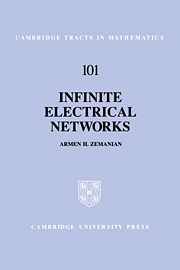8 - Applications
Published online by Cambridge University Press: 05 February 2012
Summary
In this last chapter we shall survey a number of instances where infinite electrical networks are useful models of physical phenomena, or serve as analogs in some other mathematical disciplines, or are realizations of certain abstract entities. We shall simply describe those applications without presenting a detailed exposition. To do the latter would carry us too far afield into quite a variety of subjects. However, we do provide references to the literature wherein the described applications can be examined more closely.
Several examples are presented in Sections 8.1 and 8.2 that demonstrate how the theory of infinite electrical networks is helpful for finding numerical solutions of some partial differential equations when the phenomenon being studied extends over an infinite region. The basic analytical tool is an operator version of Norton's representation, which is appropriate for an infinite grid that is being observed along a boundary. In effect, the infinite grid is replaced by a set of terminating resistors and possibly equivalent sources connected to the boundary nodes. In this way, the infinite domain of the original problem can be reduced to a finite one – at least so far as one of the spatial dimensions is concerned. This can save computer time and memory-storage requirements.
In Section 8.3 we describe two classical problems in the theory of random walks on infinite graphs and state how infinite-electrical-network theory solves those problems. Indeed, resistive networks are analogs for random walks.
- Type
- Chapter
- Information
- Infinite Electrical Networks , pp. 267 - 293Publisher: Cambridge University PressPrint publication year: 1991

